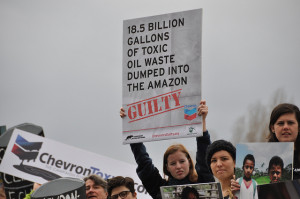In ‘Chilling’ Ruling, Chevron Granted Access to Activists’ Private Internet Data
JUSTICE, 15 Jul 2013
Lauren McCauley - Common Dreams
“Sweeping” subpoena violates rights of those who spoke out against oil giant’s devastating actions in Ecuador.

Following their guilty sentence for the dumping of 18.5bn gallons of toxic waste in the Ecuadorian Amazon, Chevron is amassing the personal information of the environmentalists and attorneys who fought against them in an effort to prove ‘conspiracy.’ (Photo: Rainforest Action Network/ cc/ Flickr)
The US government is not the only entity who, with judicial approval, is amassing massive amounts of personal information against their so-called enemies.
A federal judge has ruled to allow Chevron, through a subpoena to Microsoft, to collect the IP usage records and identity information for email accounts owned by over 100 environmental activists, journalists and attorneys.
The oil giant is demanding the records in an attempt to cull together a lawsuit which alleges that the company was the victim of a conspiracy in the $18.2 billion judgment against it for dumping 18.5 billion gallons of oil waste in the Ecuadorean Amazon, causing untold damage to the rainforest.
The “sweeping” subpoena was one of three issued to Google, Yahoo! and Microsoft.
“Environmental advocates have the right to speak anonymously and travel without their every move and association being exposed to Chevron,” said Marcia Hofmann, Senior Staff Attorney with the Electronic Frontier Foundation, who—along with environmental rights group EarthRights International (ERI)—had filed a motion last fall to “quash” the subpoenas.
“These sweeping subpoenas create a chilling effect among those who have spoken out against the oil giant’s activities in Ecuador,” she added at the time.
According to ERI, the subpoena demands the personal information about each account holder as well as the IP addresses associated with every login to each account over a nine-year period. “This could allow Chevron to determine the countries, states, cities or even buildings where the account-holders were checking their email,” they write, “so as to ‘infer the movements of the users over the relevant period and might permit Chevron to makes inferences about some of the user’s professional and personal relationships.'”
In their statement about the ruling, ERI notes that the argument given by presiding US District Court Judge Lewis Kaplan—who was previously accused of prejudice against the Ecuadorians and their lawyers—was as “breathtaking as the subpoena itself.” They continue:
According to Judge Kaplan, none of the account holders could benefit from First Amendment protections since the account holders had “not shown that they were U.S. citizens.”
Now, let’s break this down. The account-holders in this case were proceeding anonymously, which the First Amendment permits. Because of this, Judge Kaplan was provided with no information about the account holders’ residency or places of birth. It is somewhat amazing then, that Judge Kaplan assumed that the account holders were not US citizens. As far as I know, a judge has never before made this assumption when presented with a First Amendment claim. We have to ask then: on what basis did Judge Kaplan reach out and make this assumption?
This work is licensed under a Creative Commons Attribution-Share Alike 3.0 License
Go to Original – commondreams.org
DISCLAIMER: The statements, views and opinions expressed in pieces republished here are solely those of the authors and do not necessarily represent those of TMS. In accordance with title 17 U.S.C. section 107, this material is distributed without profit to those who have expressed a prior interest in receiving the included information for research and educational purposes. TMS has no affiliation whatsoever with the originator of this article nor is TMS endorsed or sponsored by the originator. “GO TO ORIGINAL” links are provided as a convenience to our readers and allow for verification of authenticity. However, as originating pages are often updated by their originating host sites, the versions posted may not match the versions our readers view when clicking the “GO TO ORIGINAL” links. This site contains copyrighted material the use of which has not always been specifically authorized by the copyright owner. We are making such material available in our efforts to advance understanding of environmental, political, human rights, economic, democracy, scientific, and social justice issues, etc. We believe this constitutes a ‘fair use’ of any such copyrighted material as provided for in section 107 of the US Copyright Law. In accordance with Title 17 U.S.C. Section 107, the material on this site is distributed without profit to those who have expressed a prior interest in receiving the included information for research and educational purposes. For more information go to: http://www.law.cornell.edu/uscode/17/107.shtml. If you wish to use copyrighted material from this site for purposes of your own that go beyond ‘fair use’, you must obtain permission from the copyright owner.